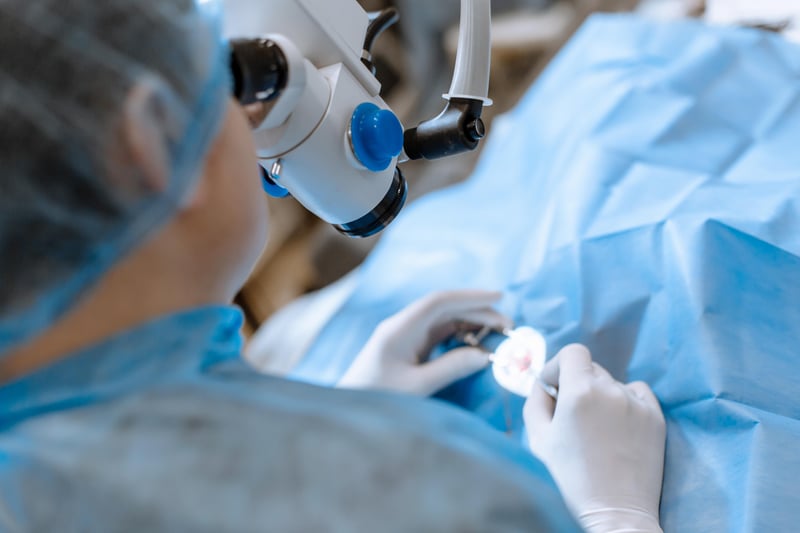Get Healthy!

- Amy Norton
- Posted July 11, 2023
AI Tool 'Reads' Brain Tumors During Surgery to Help Guide Decisions
Scientists have developed an artificial intelligence (AI) tool capable of deciphering a brain tumor's genetic code in real time, during surgery -- an advance they say could speed diagnosis and personalize patients' treatment.
The researchers trained the AI tool to recognize the different genetic features of gliomas, a group of tumors that constitute the most common form of brain cancer among adults.
Not all gliomas are the same, however. Most people are diagnosed with one of three subtypes that each have different genetic features -- and, critically, different degrees of aggressiveness and treatment options.
Right now, doctors called pathologists can analyze gliomas for those genetic markers, in what's known as molecular diagnosis. But the process takes days to weeks, said Dr. Kun-Hsing Yu, the senior researcher on the new study.
In contrast, the AI tool his team is developing can enable molecular diagnosis in 10 to 15 minutes. That means it could be done during surgery, according to Yu, an assistant professor of biomedical informatics at Harvard Medical School, in Boston.
The technology, called CHARM, also appears high on the accuracy scale. When Yu's team put it to the test with glioma samples it had never "seen" before, the AI tool was 93% accurate in distinguishing the three different molecular subtypes.
Being able to make such distinctions in the operating room is critical, Yu and other experts said, because it could change how a patient is treated.
Some gliomas are less aggressive, and surgeons can be more conservative in removing brain tissue -- which can minimize side effects.
Other gliomas, such as glioblastoma, are highly aggressive. So surgeons will try to remove as much of the cancer as possible, and sometimes implant "wafers" of slowly released chemotherapy drugs directly into the brain.
"This breakthrough technology has the potential to guide surgical decisions by providing real-time molecular diagnosis during brain tumor surgeries," said Atique Ahmed, an associate professor of neurological surgery at Northwestern University Feinberg School of Medicine in Chicago.
Ahmed, who was not involved in the study, called the tool's 93% accuracy "impressive," but noted that it can be improved.
"It's important to remember that the 7% inaccuracy is not just a number," he said. "It represents patients with very aggressive diseases who could benefit greatly from more precise diagnoses."
Yu agreed that the performance can be further refined, and CHARM is not yet ready for prime time. It has to be tested in real-world settings, he said, and cleared by the U.S. Food and Drug Administration.
The researchers are working with several hospitals in different areas of the world to put CHARM to that real-world test.
Interest in using AI in medical diagnoses has exploded in recent years. The hope is that AI algorithms will assist specialists in analyzing images -- from mammograms or CT scans, for example -- to get a faster, more accurate verdict.
No one wants to replace doctors, Yu stressed. "We want to use AI as a tool."
CHARM is a much more memorable acronym for Cryosection Histopathology Assessment and Review Machine. Yu's team developed the tool using more than 2,300 frozen tumor samples from 1,524 patients treated for glioma at various U.S. hospitals.
The work, described online July 7 in the journal Med, is not the only effort to improve glioma diagnosis using AI.
Other tools are under study, including one called DeepGlioma. Dr. Daniel Orringer, a neurosurgeon at NYU Langone's Perlmutter Cancer Center in New York City, is one of the researchers on that project.
He said that right now, molecular diagnosis of glioma is not only time-consuming and expensive, but not available at all hospitals where patients are treated. AI has the potential to "democratize molecular testing," Orringer said.
CHARM, he said, is "particularly attractive" in that regard, because it could ultimately be used at any hospital that has the capacity to digitize histology slides (microscopic images of patients' tumor samples).
Yu made a similar point. The other AI tools in development for glioma require a special type of microscope that is not available at all hospitals -- even in wealthy countries, let alone the developing world, he said.
And while the current study focused on glioma, Yu said CHARM could be trained to aid in diagnosing other types of brain tumors, too.
Ahmed called that potential "versatility" promising.
"The development of CHARM represents a significant leap forward in the quest for precise and rapid molecular diagnosis during brain tumor surgeries," he said.
More information
The American Brain Tumor Association has more on glioma.
SOURCES: Kun-Hsing Yu, MD, PhD, assistant professor, biomedical informatics, Harvard Medical School, Boston; Atique Ahmed, PhD, associate professor, neurological surgery, Northwestern University Feinberg School of Medicine, Chicago; Daniel Orringer, MD, neurosurgeon, Perlmutter Cancer Center, NYU Langone, associate professor, neurosurgery, NYU Grossman School of Medicine, New York City; Med, July 7, 2023, online

